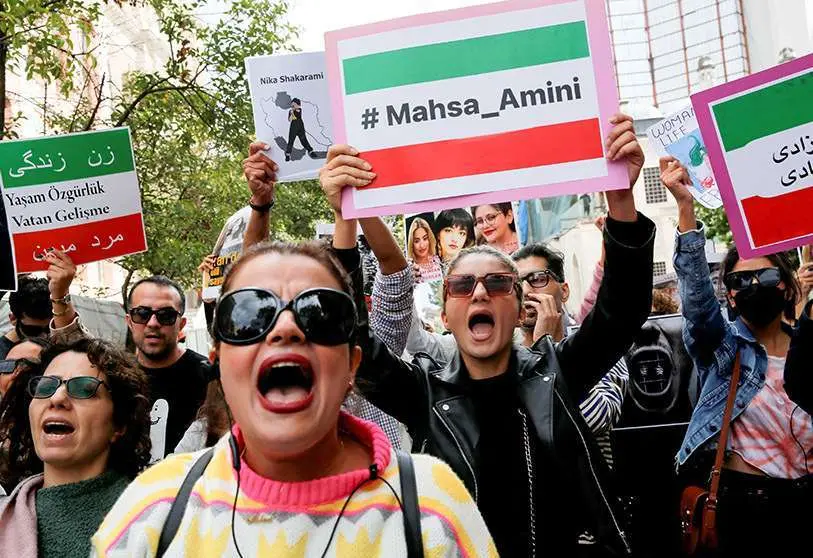Political prisoners in Iran warn of being threatened with death in Evin

Two days before a fire engulfed a section of Iran's Evin prison, resulting in the loss of at least eight lives, a riot police unit deployed to the site and began guarding the corridors, chanting "God is the greatest" and beating cell doors with batons, sources told Reuters.
Since the arrest and subsequent death of 22-year-old Amini, countless activists and protesters have been detained by the Iranian government, one of them being Hossein Ronaghi. Shocking images emerged on Thursday of the arrest of the free speech activist, who was strangled and taken to the prosecutor's office. Since the day of his arrest, he has been held in Tehran's Evin prison and his family say he is at risk of death due to a kidney condition, and that his legs are also broken. After the fire devastated the prison, Ronaghi had a brief phone call with his mother, but "could only say a few words and could barely speak". The judiciary says eight people died during the Evin prison fire, but informed sources in Iran Wire reported that there were at least 13 people.
The infamous Evin prison in Tehran, Iran is on fire. Reports says gunfire heard.
— Masih Alinejad ?️ (@AlinejadMasih) October 15, 2022
The lives if prisoners are in danger.
Family members of prisoners are shocked and horrified. #MahsaAmini pic.twitter.com/JAdeuoZ9FM
Ronaghi is just one of several notorious rights activists, journalists and lawyers who have been arrested and whose supporters fear they may never leave the prison, where most political detainees are held, alive. The fire on 15 October only added to concerns about the welfare of the prisoners, as activists accused the authorities of firing tear gas and metal pellets inside the prison, with none of the political prisoners reportedly injured. "We heard gunfire and detainees chanting 'death to Khamenei'," said one prisoner held in the part of the prison where prisoners convicted of financial crimes are held. IHR said thousands had been arrested across the country in the crackdown, including at least 36 journalists, 170 students, 14 lawyers and more than 580 activists.
October 19 - Sanandaj, Kurdistan Province, western Iran -Nabovat district-Protesters chanting: "Death to the dictator!", "Death to Khamenei!"#IranRevoIution2022 pic.twitter.com/cA046uF7tI
— hamid enayat (@h_enayat) October 19, 2022
Roya Boroumand, director of the Washington-based Abdorrahman Boroumand Center, said the situation was exacerbated by the large number of new prisoners brought into jails, including Evin and Fashafouyeh Greater Tehran Prison. "We are very concerned about the treatment of detainees," she told AFP. Overcrowding means "there is no choice but to sit or sleep in shifts" in areas including prison gyms. Analysts say the mass arrests are a key strategy in trying to combat the nationwide wave of protests, which present the biggest social problem since 1979.
Ronaghi, has for years been one of the most courageous critics of the Islamic Republic still living in the country. Security forces made an initial attempt to arrest him on 22 September while he was giving a live interview to Iran International TV, but he managed to sneak out of his flat. Two days later he and his lawyers were arrested. Following Evin's arson, Amnesty International urged access for independent monitors "to protect prisoners from further unlawful killings, torture and other ill-treatment".
October 18 - Saqqez, western Iran -Locals are establishing roadblocks and taking control of their streets as they continue the nationwide protests against the regime on the 33rd night of the uprising. pic.twitter.com/VZd7T8w5iy
— hamid enayat (@h_enayat) October 18, 2022
In addition to Ronaghi, Arash Sadeghi was imprisoned in Evin on 12 October, despite suffering from chondrosarcoma, a rare form of bone cancer. IHR expressed concern that several activists remained incommunicado behind bars, including journalist and activist Golrokh Iraee and prominent blogger Amir Emad Mirmirani, known as Jadi.
The human rights group said some detainees had given "televised self-incriminating confessions under duress and torture" and had also been subjected to verbal insults while in custody. Prisoners have testified that they were severely beaten, tortured during interrogation and deprived of food and drinking water, were tortured and even suffered broken limbs".








